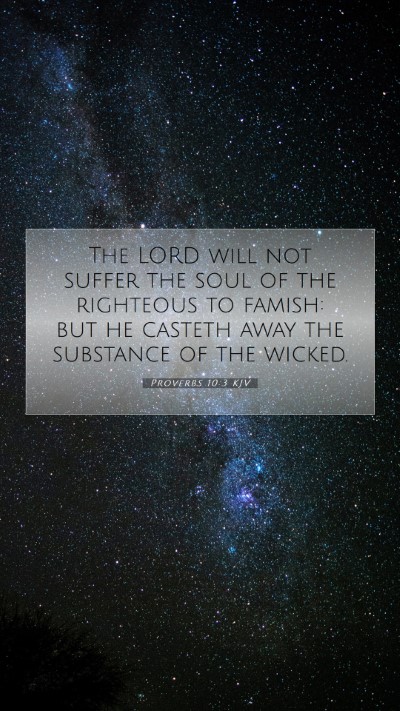Understanding Proverbs 10:3
The verse Proverbs 10:3 states, "The LORD does not let the righteous go hungry, but he thwarts the craving of the wicked." This verse captures key themes of divine provision and justice, showcasing God's care for the righteous and His opposition to the wicked. The following analysis explores its meaning through various public domain commentaries.
Bible Verse Meanings
Proverbs 10:3 conveys reassurance to believers about God's provision and serves as a warning to the wicked. It reinforces the concept that those who are righteous have faith in God's sustenance, while the cravings of the wicked are ultimately thwarted. This dichotomy reveals the moral fabric that lies at the heart of biblical teaching.
Bible Verse Interpretations
The interpretations provided by commentators shed light on the underlying principles. Matthew Henry notes that God provides for the righteous in ways that may not always be immediately visible. Albert Barnes emphasizes that the cravings of the wicked represent insatiable desires that lead to dissatisfaction and, ultimately, divine judgment. Adam Clarke highlights the assurance that believers can find in their relationship with God, which contrasts with the futility experienced by the wicked.
Insights from Matthew Henry
Henry suggests that this verse illustrates the differentiation between the righteous and the wicked clearly. The righteous can rely on God's promises for sustenance, while the wicked, regardless of their attempts to fulfill their desires, will face God's thwarting hand. This perspective provides a deeper understanding of divine justice and commitment to those who seek righteousness.
Insights from Albert Barnes
Barnes interprets the verse as a reflection of God's providence. He explains that the "cravings of the wicked" may refer to their relentless pursuit of material gain, which ultimately leads to disappointment. He underscores that God's provision caters to the needs of the righteous rather than the fleeting desires of the wicked, highlighting the distinction in outcomes based on one's moral alignment.
Insights from Adam Clarke
Clarke contextualizes the verse by showing that it serves as a social commentary. He points out that the society in Proverbs often faced issues of inequality and injustice, with the righteous frequently encountered struggles. Yet, God's promise indicates a greater truth: that the righteous will find fulfillment in Him, whereas the desires of the wicked will lead to their undoing.
Key Themes in Proverbs 10:3
- Divine Provision: God's willingness to provide for those who are righteous.
- Moral Consequence: The inevitable thwarting of the wicked's desires as a form of divine justice.
- Contrast Between Righteous and Wicked: A clear distinction that emphasizes the importance of moral choices in one’s life.
Application of the Verse
Understanding Proverbs 10:3 prompts readers to reflect on their own lives and spiritual journeys. It encourages believers to trust in God's provision, even in times of need, while providing a stern warning about the futility of wickedness. This wisdom can be essential for those in bible study groups or online Bible study sessions.
Practical Lessons for Daily Life
- Emphasizing trust in God during financial hardships or personal struggles.
- Recognizing the peace that comes from living a righteous life as opposed to the turmoil of wrongdoings.
- Encouraging discussions about the nature of desire and fulfillment within bible study lessons.
Related Bible Cross References
- Psalms 37:25: "I have been young, and now am old, yet I have not seen the righteous forsaken, nor his children begging for bread."
- Proverbs 13:25: "The righteous eat to their hearts’ content, but the stomach of the wicked goes hungry."
- Matthew 6:33: "But seek first the kingdom of God and his righteousness, and all these things will be added to you."
Conclusion
In summation, Proverbs 10:3 serves as an affirmation of God's steadfast love for the righteous and a cautionary note regarding the ultimate dissatisfaction of the wicked. The wisdom contained within this verse is a valuable resource for Bible study tools and guides, helping individuals grasp the significance and implications of their faith.


